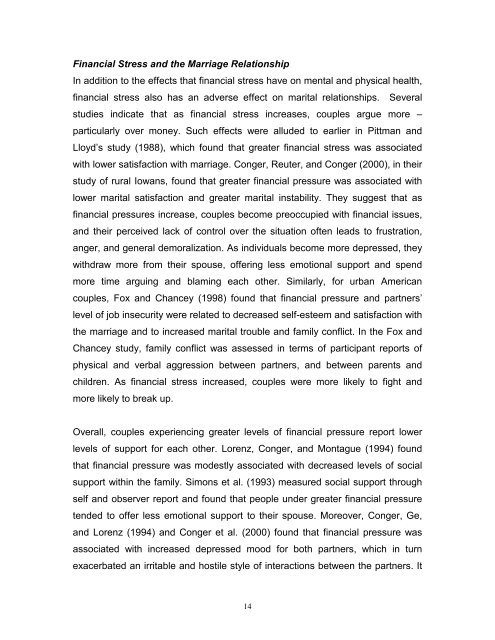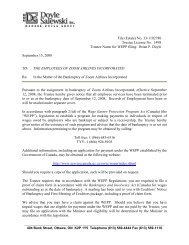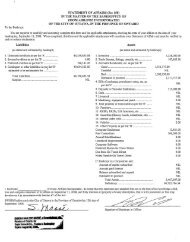Download the Carleton University Report (PDF). - Doyle Salewski Inc
Download the Carleton University Report (PDF). - Doyle Salewski Inc
Download the Carleton University Report (PDF). - Doyle Salewski Inc
Create successful ePaper yourself
Turn your PDF publications into a flip-book with our unique Google optimized e-Paper software.
Financial Stress and <strong>the</strong> Marriage Relationship<br />
In addition to <strong>the</strong> effects that financial stress have on mental and physical health,<br />
financial stress also has an adverse effect on marital relationships. Several<br />
studies indicate that as financial stress increases, couples argue more –<br />
particularly over money. Such effects were alluded to earlier in Pittman and<br />
Lloyd’s study (1988), which found that greater financial stress was associated<br />
with lower satisfaction with marriage. Conger, Reuter, and Conger (2000), in <strong>the</strong>ir<br />
study of rural Iowans, found that greater financial pressure was associated with<br />
lower marital satisfaction and greater marital instability. They suggest that as<br />
financial pressures increase, couples become preoccupied with financial issues,<br />
and <strong>the</strong>ir perceived lack of control over <strong>the</strong> situation often leads to frustration,<br />
anger, and general demoralization. As individuals become more depressed, <strong>the</strong>y<br />
withdraw more from <strong>the</strong>ir spouse, offering less emotional support and spend<br />
more time arguing and blaming each o<strong>the</strong>r. Similarly, for urban American<br />
couples, Fox and Chancey (1998) found that financial pressure and partners’<br />
level of job insecurity were related to decreased self-esteem and satisfaction with<br />
<strong>the</strong> marriage and to increased marital trouble and family conflict. In <strong>the</strong> Fox and<br />
Chancey study, family conflict was assessed in terms of participant reports of<br />
physical and verbal aggression between partners, and between parents and<br />
children. As financial stress increased, couples were more likely to fight and<br />
more likely to break up.<br />
Overall, couples experiencing greater levels of financial pressure report lower<br />
levels of support for each o<strong>the</strong>r. Lorenz, Conger, and Montague (1994) found<br />
that financial pressure was modestly associated with decreased levels of social<br />
support within <strong>the</strong> family. Simons et al. (1993) measured social support through<br />
self and observer report and found that people under greater financial pressure<br />
tended to offer less emotional support to <strong>the</strong>ir spouse. Moreover, Conger, Ge,<br />
and Lorenz (1994) and Conger et al. (2000) found that financial pressure was<br />
associated with increased depressed mood for both partners, which in turn<br />
exacerbated an irritable and hostile style of interactions between <strong>the</strong> partners. It<br />
14





